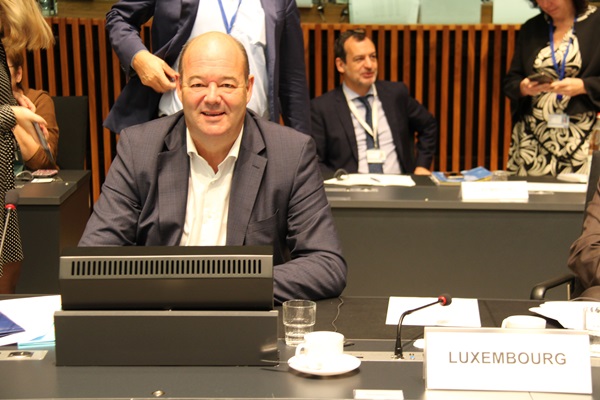 Claude Haagen, Luxembourg’s Minister of Agriculture, Viticulture and Rural Development;
Credit: MA
Claude Haagen, Luxembourg’s Minister of Agriculture, Viticulture and Rural Development;
Credit: MA
On Monday 23 October 2023, a Council meeting of the European Union took place in Luxembourg, discussing agriculture and fishery.
Claude Haagen, Luxembourg’s Minister of Agriculture, Viticulture and Rural Development, participated.
A significant focus during this Council meeting revolved around addressing the issue of food waste and potential changes to the framework directive on this matter. The European Commission put forward a proposal to have Member States decrease food waste by 30% per capita in commercial settings, dining establishments, and households by 2030, along with a 10% reduction target in the agri-food processing sector.
During his speech, Minister Haagen expressed confidence that the Grand Duchy would manage to reduce food waste by 30% per year and per person by 2030, since Luxembourg is already strongly committed to the fight against food waste. The numerous awareness campaigns among consumers and the agri-food sector, as well as private initiatives supported by Luxembourg’s Ministry of Agriculture, have borne fruit and reduced the volume of residual food waste in commerce, gastronomy and households by 23% between 2018 and 2021, noted Minister Haagen. As for the processing sector, the ambition to reduce food waste by 10% would require more effort, including an in-depth analysis of the factors causing waste. According to Minister Haagen, Luxembourg must continue its anti-waste awareness efforts towards all players in the agri-food chain, and continue to educate young people to eat local and seasonal while avoiding waste.
The ministers also discussed the situation of agricultural markets impacted by the war in Ukraine. In this context, Mykola Solskyi, Minister of Agrarian Policy and Food of Ukraine, briefed the Council in person on the measures Ukraine has taken to improve the transport of its agricultural products to and through the Union European Union, through solidarity channels and explained how export licences work. In addition to the unstable geopolitical situation, climatic hazards also weigh on the agricultural sector, and producers require targeted responses and aid adapted to the needs of each country. This is why, according to Minister Haagen, the strategic plans which implement the common agricultural policy must remain flexible and must allow the mobilisation of direct payments in order to support farmers. Thus, for example, the Ministry of Agriculture, Viticulture and Rural Development co-finances 65% of farmers' subscriptions to insurance against crop losses suffered following climatic hazards. This support has continuously increased in recent years.








